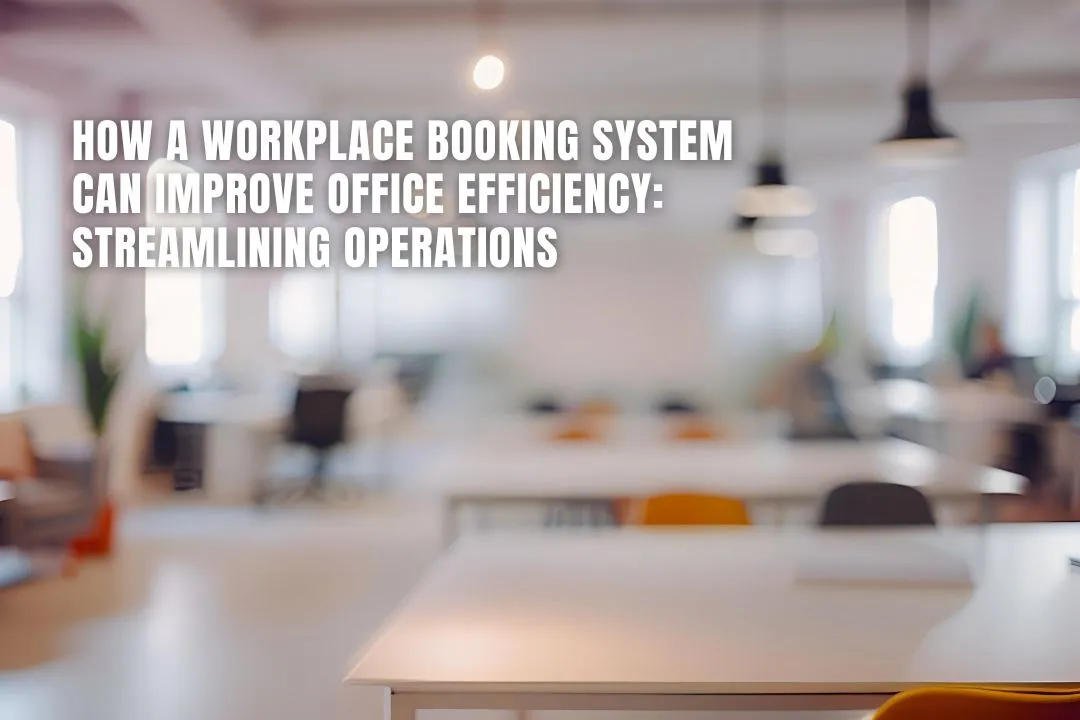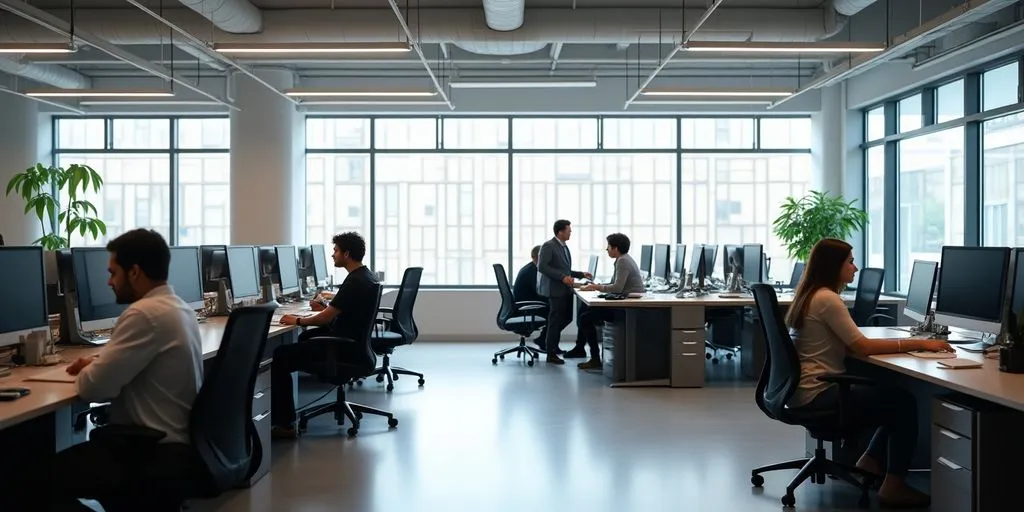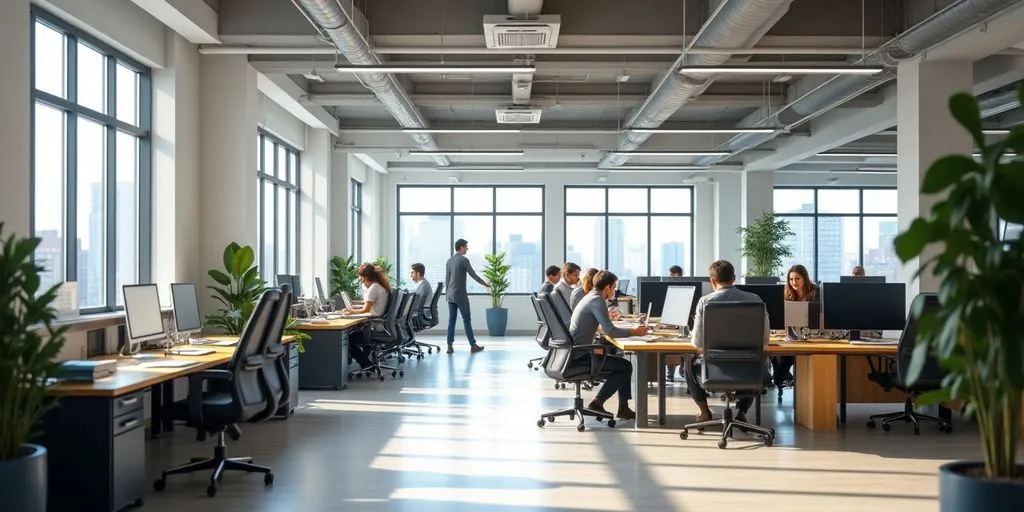How a Workplace Booking System Can Improve Office Efficiency: Streamlining Operations
November 11, 2024

In today's fast-paced work environment, maximizing office efficiency is more important than ever. A workplace booking system can play a crucial role in achieving this goal. By streamlining operations and optimizing space usage, these systems help organizations adapt to modern work needs, especially with the rise of hybrid working models. Let's explore some key takeaways on how these systems can enhance office efficiency through booking systems.
Key Takeaways on Workplace Booking Systems for Efficiency
- Enhancing Space Utilization: Desk booking systems optimize office space by providing real-time availability of desks and identifying underutilized areas. This allows companies to repurpose spaces and adjust office layouts to better suit employee needs, leading to improved space efficiency and productivity.
- Supporting Hybrid Work Models: These systems facilitate smooth transitions between remote and in-office work, allowing employees to book desks in advance and coordinate team collaboration days. Flexible solutions help companies adapt to hybrid work environments, boosting both employee satisfaction and productivity.
- Reducing Administrative Overhead: Automation of desk booking processes minimizes manual desk assignments, reducing administrative workload. It also enables automatic reminders and cancellations, making desk management more efficient and reducing the potential for errors.
- Leveraging Data for Better Decision Making: Desk booking systems provide valuable analytics on workspace utilization. By tracking data such as desk usage patterns and employee preferences, organizations can make data-driven decisions to optimize space, enhance resource allocation, and improve office layout designs.
- Improving Employee Experience: Desk booking systems provide employees with the autonomy to choose their workspaces, which increases satisfaction and productivity. They also reduce time spent searching for available desks and make collaboration easier by allowing teams to book adjacent workspaces.
- Implementing Best Practices: Successful desk booking systems require understanding user needs, selecting the right software, providing comprehensive training, and establishing a clear desk policy. Monitoring and optimizing the system over time ensures that it continues to meet the needs of employees and the organization.
- Real-World Success Stories: Companies like Softchoice have successfully implemented desk booking systems to support hybrid work, reduce real estate costs, and improve employee satisfaction. The systems have also led to cost savings through optimized space usage and enhanced collaboration.
- Cost Savings and Efficiency: Desk booking systems help organizations reduce operational costs by better utilizing office space. This, in turn, leads to increased employee satisfaction and more effective teamwork.
Register Your LLC
Company Registration
START NOWEnhancing Space Utilization for Optimal Office Efficiency

Real-Time Desk Availability and Allocation
Desk booking systems allow companies to see which desks are available at any moment. This real-time visibility helps employees find a workspace quickly, reducing time spent searching for a desk. By knowing where to sit, teams can focus more on their tasks and less on logistics.
Reducing Underutilized Spaces
Identifying desks that are rarely used is essential. Companies can then decide to repurpose these areas for better use. For example, a desk that is seldom occupied could be turned into a collaborative space or a meeting room. This change not only maximizes space but also encourages teamwork and creativity.
Strategic Office Layout Adjustments
Using data from desk booking systems, businesses can adjust their office layouts. This means they can create spaces that fit how employees actually work. For instance, if many employees prefer to work in groups, the office can be redesigned to include more collaborative areas.
By optimizing space utilization, companies can create a more organized and efficient workspace, leading to improved productivity.
In summary, enhancing space utilization through desk booking systems can lead to a more efficient office environment, benefiting both the organization and its employees.
Supporting Hybrid Work Models with Flexible Solutions
In today's work environment, hybrid work models are becoming increasingly popular. These models allow employees to split their time between home and the office, creating a need for flexible solutions that support this transition.
Facilitating Seamless Remote and In-Office Transitions
To make the shift between remote and in-office work smoother, companies can:
- Implement desk booking systems that allow employees to reserve their workspace in advance.
- Provide clear guidelines on how to use these systems effectively.
- Ensure that technology is in place to support virtual meetings and collaboration.
Coordinating Team Collaboration Days
Having designated days for team collaboration can enhance productivity. Here are some strategies:
- Schedule regular team days where everyone is encouraged to work from the office.
- Use booking systems to manage space and ensure everyone has a desk.
- Encourage teams to plan their in-office days together to maximize collaboration.
Empowering Employee Choice in Work Locations
Giving employees the freedom to choose where they work can lead to higher satisfaction. This can be achieved by:
- Allowing employees to select their preferred work location based on their tasks for the day.
- Providing options for both remote work and in-office work to cater to different needs.
- Regularly gathering feedback to improve the booking system and workspace arrangements.
By adopting flexible solutions, companies can create a more adaptable work environment that meets the needs of their employees while enhancing overall productivity.
Reducing Administrative Overhead with Automation
In today’s fast-paced work environment, automating booking processes can significantly cut down on administrative tasks. By using a desk booking system, organizations can streamline their operations and reduce the need for manual intervention in desk assignments. This not only saves time but also minimizes errors that can occur with manual processes.
Streamlining Booking Processes
- Automated systems allow employees to book desks easily without needing administrative approval.
- Notifications can be sent out automatically to remind users of their bookings.
- Changes or cancellations can be handled through the system, reducing back-and-forth communication.
Minimizing Manual Desk Assignments
- Desk booking software can automatically assign desks based on availability, ensuring that no two people are assigned to the same desk.
- This reduces the workload on administrative staff, allowing them to focus on more strategic tasks.
- The system can also track desk usage, helping to identify patterns and optimize space utilization.
Simplifying Reporting and Analytics
- With automated systems, generating reports on desk usage becomes straightforward and quick.
- Organizations can easily access data on peak usage times and occupancy rates, which can inform future office layout decisions.
- This data-driven approach helps in making informed decisions about resource allocation and office design.
By implementing automation in desk booking, companies can not only reduce administrative overhead but also enhance overall productivity and efficiency in the workplace.
In conclusion, adopting a desk booking system can lead to significant improvements in operational efficiency, allowing organizations to focus on their core activities while ensuring that workspace management is handled smoothly and effectively.
Leveraging Data for Informed Resource Management
Monitoring Workspace Utilization Trends
Desk booking systems provide valuable insights into how spaces are used. By tracking workspace utilization trends, managers can see which areas are popular and which are often empty. This data helps in making informed decisions about office layout and space allocation. For example, if a certain area is rarely used, it might be time to rethink its purpose or redesign it to better meet employee needs.
Optimizing Resource Allocation Based on Data
With the data collected, office managers can optimize how resources are allocated. They can analyze:
- Desk usage rates to identify peak times and adjust staffing accordingly.
- Employee preferences to ensure that popular workspaces are available when needed.
- Collaboration patterns to create spaces that enhance teamwork.
Enhancing Decision-Making with Analytics
Analytics from desk booking systems allow managers to evaluate the effectiveness of changes made in the office. By reviewing data on how changes impact productivity and employee satisfaction, they can refine their strategies. This continuous improvement cycle ensures that the office environment evolves to meet the needs of its users.
By leveraging data insights, organizations can create a workspace that not only meets employee needs but also enhances overall productivity and satisfaction.
In summary, using data effectively can lead to better space management, improved employee morale, and a more efficient workplace. Understanding how spaces are utilized is key to creating an environment that fosters productivity and collaboration.
Improving Employee Experience and Productivity
Providing Autonomy in Workspace Selection
Desk booking systems give employees the freedom to choose their workspaces. This means they can select a desk that fits their personal style and needs. When employees feel they have control over their environment, they are generally happier and more productive.
Facilitating Efficient Collaboration
With desk booking software, teams can easily reserve desks next to each other. This makes it simpler for colleagues to work together on projects. By having a designated space for teamwork, employees can share ideas and solve problems more effectively.
Reducing Time Spent on Desk Searches
One of the biggest time-wasters in an office is searching for an available desk. Desk booking systems help eliminate this issue by showing real-time availability. Employees can quickly find and reserve a desk, allowing them to focus on their work instead of wandering around the office.
Desk booking systems not only simplify the process of finding a workspace but also enhance overall employee satisfaction and productivity.
By implementing a desk booking system, companies can create a more enjoyable and productive work environment for their employees. This leads to a happier workforce and better overall performance.
Implementing Best Practices for Desk Booking Systems
Understanding User Needs and Preferences
To create a successful desk booking system, it’s essential to understand what employees want. Here are some steps to gather this information:
- Conduct surveys to ask employees about their preferences.
- Hold focus groups to discuss their needs in detail.
- Analyze feedback to guide your system's design.
Choosing the Right Desk Booking Solution
Selecting the right system is crucial. Consider these factors:
- Ensure it integrates well with your current IT setup.
- Look for features that meet your organization’s specific needs.
- Evaluate user-friendliness to encourage adoption.
Providing Comprehensive Training and Support
Training is key to making sure everyone can use the system effectively. Here’s how to do it:
- Organize training sessions for all employees.
- Create easy-to-follow guides and FAQs.
- Offer ongoing support to address any questions.
A well-trained team will feel more confident and less reliant on IT support.
Monitoring and Optimizing the System
Regularly check how the desk booking system is performing. Here are some tips:
- Track desk usage to identify trends.
- Adjust the number of desks based on actual needs.
- Use data to improve office layout and efficiency.
Establishing a Clear Desk Policy
A clear desk policy helps maintain a tidy workspace. Key points include:
- Require employees to clear personal items daily.
- Provide storage options for personal belongings.
- Encourage digital storage to reduce clutter.
By following these best practices, organizations can ensure a smooth implementation of desk booking systems, leading to improved office efficiency and employee satisfaction.
Real-World Success Stories of Desk Booking Systems

Case Study: Softchoice's Hybrid Work Model
Softchoice implemented a desk booking system to support its hybrid work model. This system provided real-time data on desk occupancy, allowing the IT department to optimize office layouts and reduce the overall footprint. As a result, the company saw a significant reduction in real estate costs and an improvement in employee satisfaction.
Achieving Cost Savings Through Space Optimization
Many organizations have reported substantial savings after adopting desk booking systems. Here are some key benefits observed:
- Reduced operational costs by optimizing space usage.
- Increased employee satisfaction due to better workspace management.
- Enhanced collaboration by grouping teams effectively.
Enhancing Employee Satisfaction and Engagement
The implementation of desk booking systems has led to improved employee experiences. Key points include:
- Increased autonomy in workspace selection.
- Better communication among team members.
- Reduced time spent searching for desks.
Desk booking systems are essential business tools and services to boost your operations, enhancing overall office efficiency and streamlining processes.
These success stories highlight how desk booking systems can transform workplaces, making them more efficient and enjoyable for employees.
Conclusion
In summary, using a desk booking system can greatly boost how well an office runs. These systems help make the best use of space, support flexible work styles, and cut down on the time spent managing desks. By allowing employees to easily reserve their workspaces, companies can save money and improve teamwork. Plus, with features that provide real-time updates and helpful analytics, businesses can make smarter choices about their office layout. Overall, adopting a desk booking system is a smart move for any organization looking to enhance productivity and create a better work environment.
Frequently Asked Questions
What is a desk booking system?
A desk booking system is a software that helps employees reserve workspaces like desks and meeting rooms. It makes sure that these spaces are used effectively.
How does a desk booking system improve office efficiency?
It helps by showing which desks are available in real-time, reducing wasted space, and allowing for better office layouts based on how spaces are used.
Can a desk booking system support hybrid work?
Yes, it allows employees to easily switch between working at home and in the office. They can book desks for days they come in, making teamwork easier.
What are the benefits of using desk booking software?
Desk booking software reduces the time spent looking for available desks, helps manage office spaces better, and improves employee satisfaction.
How can we make sure employees use the desk booking system effectively?
Providing training sessions, easy-to-follow guides, and encouraging feedback can help employees learn how to use the system well.
Are there any success stories from companies using desk booking systems?
Yes, many companies like Softchoice have seen benefits such as cost savings and happier employees after implementing desk booking systems.

